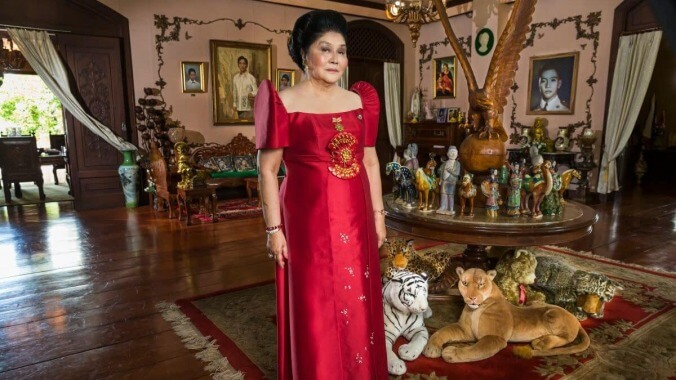The Kingmaker gawks at obscene wealth, but finds a much more disturbing legacy behind it


“I miss the clout of being First Lady,” admits Imelda Marcos, the widow of former Philippine president Ferdinand Marcos, near the beginning of photographer-filmmaker Lauren Greenfield’s new documentary, The Kingmaker. When first introduced, Marcos is being driven through the streets of Manila in 2014—decades after the period of martial law her husband instituted in 1972 and his death in exile in 1989. As the film starts out chronicling the Marcoses’ rise to power, with Imelda providing present-day commentary from her apartment, viewers might reasonably expect something along the lines of Greenfield’s earlier The Queen Of Versailles, which followed a formerly mega-rich Floridian couple brought low by the 2008 recession. Indeed, while researching the project, Greenfield herself thought she might find a “redemption story.” But the film eventually proves to be a far more troubling examination of the Marcoses’ continued political hold in the Philippines.
In keeping with Greenfield’s career-long interests (as detailed in her last doc, Generation Wealth), The Kingmaker does double as a portrait of grotesque extravagance—in this case of the Marcoses, whose profligacy is by now well-known. Apart from Imelda’s infamous sartorial excesses (the “shoe thing,” as she puts it), we see paintings by Picasso, Fragonard, and Michelangelo just hanging in her plush digs, even as she laments how her family has had everything unjustly taken away from them. These, as well as other contested assets, are the subject of drawn-out litigation, and also the focus of the Philippine Commission On Good Government, an agency created with the express intention of repatriating the Marcoses’ ill-gotten wealth. (A fitting Freudian slip: “When you lose your money… your mother, you lose everything,” Imelda says in an 85th-birthday speech.) The example Greenfield returns to most frequently, though, is also the most absurd: the wildlife sanctuary Imelda established on the island of Calauit by forcefully evicting the area’s inhabitants, and populating it with exotic animals imported from Kenya.
For context purposes, Greenfield includes interviews with former president “Noynoy” Aquino, whose father “Ninoy” Aquino was a vocal opponent of the Marcos regime (and later assassinated upon his return to the Philippines after a period of exile), and whose mother, former president Corazon “Cory” Aquino, led the People Power Revolution that finally ended Marcos’ presidency in 1986. Likewise, activists such as Etta Rosales and May Rodriguez discuss the numerous human rights abuses of the Marcos regime, including harrowing accounts of rape they endured under martial law. (One particular passage describes a torture method known as the “San Juanico Bridge,” so named for a building project that Ferdinand Marcos gave to his wife as a birthday gift.) Of course, when recalling the period, Imelda feels only a kind of wistful nostalgia, and laments her present inability to act as “mother” to her country.
As a portrait of a controversial political figure, The Kingmaker bears some comparison to Errol Morris’ The Unknown Known and The Fog Of War. But a crucial difference is that unlike Donald Rumsfeld and Robert McNamara, who were interviewed long after they’d left office, Imelda and the Marcos family are far from being out of power. A better comparison might be to American Dharma, since Imelda, well-known for her glamour and adept at weaponizing her image-based celebrity, is clearly attempting to rewrite the narrative of her family’s legacy—and, because of systemic poverty and a widespread lack of education, succeeding. (In a set of classroom interviews, schoolchildren express their conception of the martial law period as a time of prosperity, order, and even greatness for the country.) Much of the film recounts the 2016 election, during which Imelda’s son, Ferdinand “Bongbong” Marcos Jr., ran for vice president. (In the Philippines, the president and vice president are elected separately.) He eventually lost to Leni Robredo, an opposition party critic of strongman President Rodrigo Duterte—though the narrow vote margins led Bongbong to file an electoral protest that’s currently awaiting a Supreme Court decision. Disconcerting, to say the least, is that the Marcoses are evidently supporters of Duterte, who has in turn expressed approval of Bongbong, as well as a desire to step down before the end of his term, if only he could find the right person—emphatically not Robredo, in his view.
All of this makes The Kingmaker Greenfield’s most urgent film by far, which only makes its lack of focus that much more frustrating. Digressive conversations with former wildlife catchers and experts, for instance, seem to exist mainly so the director can draw a parallel between the animals’ inbreeding issues and the Marcoses’ de facto dynastic rule. And given the troubling political machinations revealed toward the end—Duterte’s installation of a pro-Marcos Supreme Court justice, charges of sedition against Robredo—the amount of time spent gawking at Imelda’s ostentation retroactively feels somewhat excessive.
More crucial, perhaps, is that Greenfield spends much of the film attempting to illustrate the title’s implicit thesis, without sufficiently delving into the behind-the-scenes political action. Certainly, it’s clear that the now 90-year-old former first lady had a major role in Bongbong’s candidacy, and has a vested interest in crafting a revisionist history of the Marcos regime. But as The Kingmaker converges on the possibility that the Marcoses might eventually return to Malacañang Palace, the attendant political maneuvering—a closing card highlights fake news Facebook accounts linked to Duterte and the Marcoses—raises questions that the film doesn’t adequately address. (Imelda’s daughter Imee, for example, belatedly emerges as something of a major player, and one is left to wonder whether her absence from the documentary is due to her own political savvy or the filmmakers’ oversight.) “Perception is real, the truth is not,” the former first lady says at one point. It’s the kind of revealing line that would clinch any cinematic profile. But by the end, Greenfield has inadvertently made the case that a more compelling film would have probed further.